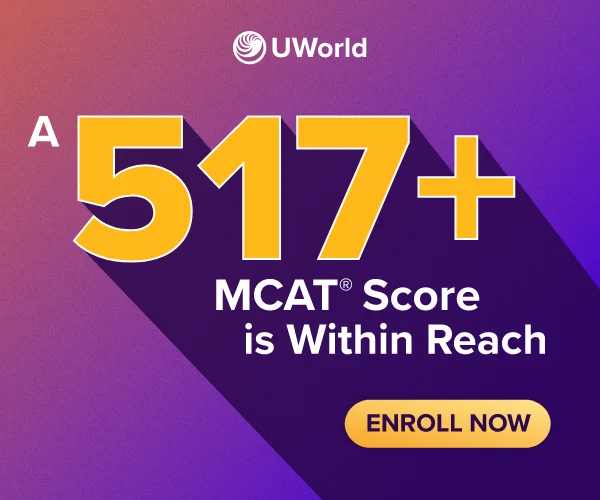For students considering a career in medicine, it is important to know the requirements for medical school long before your medical school application timeline begins.
If you wait until your junior or senior year as an undergrad to begin thinking about your medical school application, you’ve waited too long. Every part of your pre-med experience should be planned and executed with medical school in mind.
Getting into a medical school is very challenging and highly competitive. According to the AAMC’s 2020 FACTS: Applicants and Matriculants Data, of the 53,030 first-year medical school applicants for the 2020-2021 school year, only 22,239 matriculated — that’s roughly 42%.
Due to the competitive nature of the process, every pre-med course should be chosen with careful consideration, each test and assignment should be given your best effort, MCAT® preparation should be a priority and begin long before the exam date, and even extracurricular activities should be planned strategically and intentionally.
This is why it is important to know what the requirements are for medical school in advance so you can begin taking steps to fulfill those requirements. This long-term planning will . . .
- Reduce stress when you start the application process
- Provide you an advantage over the competition
- Increase your chances of being accepted into the medical school of your choice
So, with these things in mind, here is an overview of the requirements you’ll need to meet to be accepted into medical school . .
Educational Requirements
Degree
In order to matriculate into medical school, it is required that you have earned your undergraduate degree from an accredited college or university. This is the pre-med portion of your journey to become a physician.
It is often assumed that pre-med students should major in a science like biology, biochemistry, or biomedical engineering, but though you must take classes pertaining to these areas of learning (more on that in a moment), it is not required that any of these choices be your major.
In fact, medical school admissions committees often look favorably on applicants with other majors — it can be something that helps an applicant stand out from the crowd. Medicine is about more than science, so a major in ethics, management, psychology, anthropology, religious studies, etc. can be advantageous in your learning process.
It’s really about finding areas of learning that interest you while being sure to fulfill your prerequisites for medical school. In a post titled “Pick a Pre-Med Major You Love,” Clara Sun, a graduate of the University of Miami and a first-year medical student, wrote:
“At the end of my freshman year, I added economics as a second major. I decided this after my friend introduced me to behavioral economics and my freshman extracurriculars reinforced my passion for the business aspect of healthcare.
“There were consistent themes of entrepreneurship and business throughout my application, and I related these interests to why I wanted to be a physician. My passions were reinforced through my second major in economics and my activities in business throughout college.”
Prerequisites for Medical School
Premedical coursework requirements vary for different medical schools. Therefore, it is crucial that you do your research and find out what the specific prerequisites are for the different medical schools you are considering.
Generally speaking, most medical schools require that you have a variety of science classes, humanities classes, and English classes. Along with prerequisites, medical schools will have a list of recommended classes, so make sure you complete those as well.
When it comes to premedical coursework, the AAMC states:
Each school also has unique requirements for coursework, lab experience, volunteer experience, and ‘shadowing’ experience. In general, students will likely complete the following types of courses:
- One year of Biology
- One year of English
- Two years of Chemistry (through Organic Chemistry)
That’s a relatively broad overview of standard prerequisites. If you take two semesters of biology, two semesters of physics, two semesters of chemistry, one semester of math, and two semesters of English, you will likely reach all of the prerequisites for your medical schools of choice. (Note: Labs are required with your science courses.)
When you’re mapping out your coursework each year of your undergraduate experience, choose a variety of courses. Once you’ve selected those courses that are prerequisites for the medical schools you’re interested in attending, select electives that you find interesting and that will broaden your base of knowledge.
If you’re ready to begin researching specific requirements for each medical school, you can find that information at the Medical School Admission Requirement website.
Academic Performance Requirements
GPA
Many students wonder what their GPA needs to be in order to be accepted into a particular medical school, but this number varies from school to school.
Just because there is not a standard minimum GPA requirement, that doesn’t mean a high GPA is unimportant. The opposite is true — a high GPA is critical when applying to medical schools.
A high GPA shows that you’re intelligent, dedicated to your academic pursuit, and ready for the intellectual rigors of medical school. It can also be a differentiator that elevates you above other students with lower GPAs.
Your GPA is not the sole factor admissions committees will consider, but it is significant. For example, an exceptional GPA could help offset an average MCAT score if the rest of your application is noteworthy.
This is another reason why the classes you choose to take as a pre-med student are so important. Outside of your prerequisites, be mindful to choose courses in which you know you will perform well. This will help boost your overall GPA.
The mean GPA for medical school applicants in 2020-2021 was 3.60. The mean GPA for matriculants was 3.73.
MCAT
The MCAT is perhaps the most important of the various requirements you will be required to meet, so it is important you be aware of the MCAT test dates and what is tested in the different MCAT sections well in advance. Your performance on this exam will be scrutinized carefully by any admissions committee considering you for attendance at their medical school.
An outstanding MCAT score is certain to move you to the front of the line in the admissions process.
The Medical College Admission Test® (MCAT) is a seven-and-a-half hour exam developed and administered by the AAMC. It’s a computer-based, multiple-choice, standardized test that not only tests your knowledge but also your critical reasoning skills. Because of the length and complexity of the exam, it is highly recommended to take an MCAT practice exam often as part of your test-prep plan.
The exam is broken down into four MCAT sections:
- Biological and Biochemical Foundations of Living Systems
- Chemical and Physical Foundations of Biological Systems
- Psychological, Social, and Biological Foundations of Behavior
- Critical Analysis and Reasoning Skills
Because it’s a standardized exam, the MCAT is perhaps the most accurate way admissions committees can measure one applicant against another. Therefore, it is important to begin preparing for this exam well before test day in order to avoid common mistakes MCAT test takers make.
If you plan to begin medical school the same year you receive your undergraduate degree (i.e., not take a gap year), you’ll want to take the MCAT before graduation so you can include your MCAT scores on your medical school applications. Many students take the MCAT in January of their junior year.
The mean MCAT score for medical school applicants in 2020-2021 was 506.4. The mean GPA for matriculants was 511.5.
Extracurricular Experiences
Along with your GPA, your prerequisites, and your MCAT scores, medical school admissions committees will look carefully at your extracurricular activities. They want to see what experiences you have in research, leadership, and patient care, so keep that in mind when planning your medical school application timeline.
Shadowing Experience
Spending time “shadowing” a practicing physician is not only good for you, showing you what your career in medicine might look like, it is of high value to admissions committees. They want to see that you have put in the time observing a physician interacting with patients, ordering tests, performing surgeries, etc. A variety of shadowing experience and the ability to answer questions about what you learned while shadowing are both important in your application process.
Clinical Experience
Though shadowing is important, it is an observatory activity. Medical schools want to see that you have some level of clinical experience too. Volunteer work in a hospital or clinic, working as an EMT or MA — these opportunities demonstrate that you have been exposed to patient care firsthand.
Leadership Experience
Demonstrating leadership and strength of character is an opportunity to stand out in a crowded field of medical school applicants. Experiences like a student council position, starting a volunteer program, leading a club or group, spearheading a community initiative, captain of an athletic team, serving as a camp counselor, etc. will bolster your chances for admittance.
Research Experience
Any research experience you have, particularly in a lab setting, is significant and can distinguish you from other applicants because not all applicants have research experience. Ask an academic advisor and check the science department website at your school to find out what research opportunities are available.
Application Requirements
Primary Application
For MD admissions, your initial application to medical school is done through an online application service called the American Medical College Application Service® (AMCAS®).
Note: Texas admissions use the Texas Medical & Dental Schools Application Service (TMDSAS) and DO admissions use the American Association of Colleges of Osteopathic Medicine Application Service (AACOMAS)
On your primary application, you will be required to include your college transcripts, your MCAT scores, information about extracurricular activities, a personal statement, and letters of recommendation.
It is during the primary application process that you will list the medical schools you want to apply to. If any of your chosen schools are interested, they will invite you to complete a secondary application.
Secondary Application
Secondary applications are much different than your primary AMCAS application. Secondary applications are unique from one another because they are sent from specific schools. In other words, this is not a standardized application.
Though they are all different, generally, secondary applications will ask you several essay questions, some short answer questions, and a list of the prerequisite courses you completed.
You can expect to see essay prompts such as:
- Describe a leadership experience you have had.
- What has been your biggest challenge in pursuing medicine?
- Tell us one thing about yourself that would help the admissions committee determine if you should be admitted to our program.
- Why are you interested in our medical school specifically?
Interview
If a medical school is considering you for admittance after reviewing your secondary application, they will invite you to their campus for an interview. This interview will either be one-on-one or in front of a panel of interviewers.
The interview is the final step in the application process. If you have made it this far, you are being strongly considered for admittance. It is important to be prepared for your medical school interview and use this opportunity to make a good impression.
Are you a pre-med student preparing to take your MCAT®? Discover why UWorld is the industry leader in high-stakes medical exam preparation. Our 2,000+ MCAT-style questions, detailed rationales for all answer options, vivid illustrations, and unparalleled performance tracking will have you confident and prepared for success on exam day. Start your 7-Day MCAT FREE trial today!




